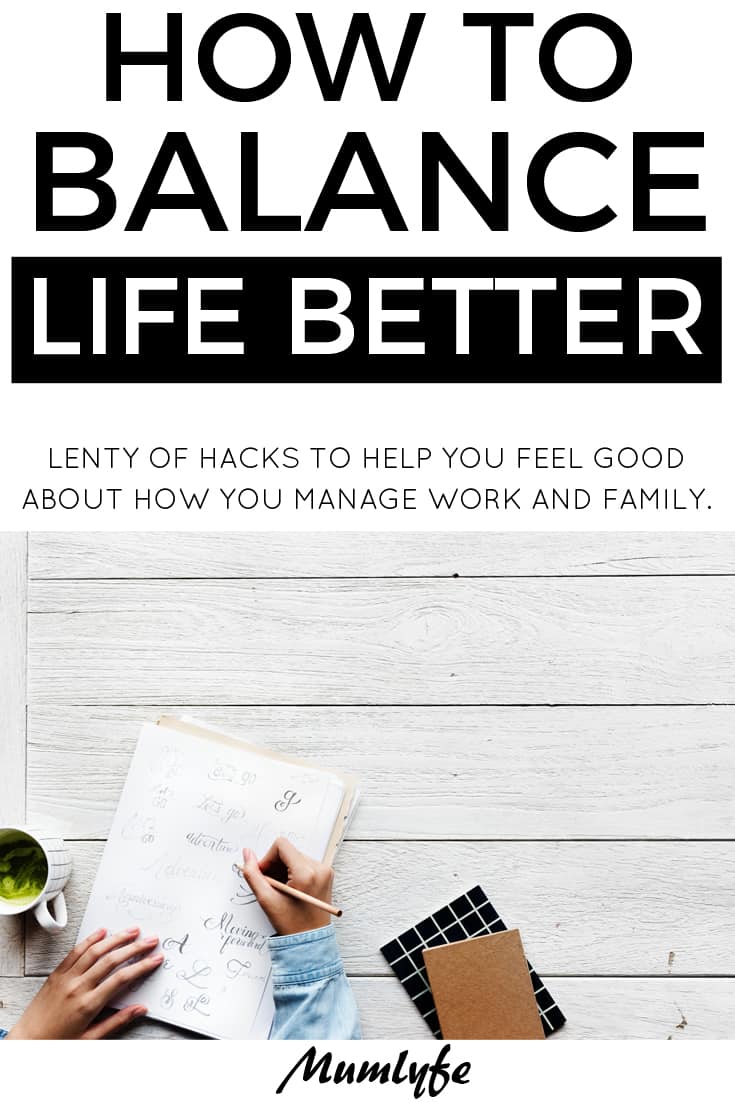The #1 parenting issue I get asked for advice about is “how to balance work and family”. How do I balance my work and family life? How do I balance being a working mother? How do I balance work and kids?
Except for three lots of maternity leave (each a little longer with each baby), I’ve been a working mother my entire parenting life. I’ve worked full time in corporate life (four days in the office, one day from home); part time in corporate life (three days in the office, one day from home); freelance from home; full time from home; and part time in the office combined with part time freelance from home (my current arrangement). During most of this time, I’ve also run a busy blog or website and volunteered my time for various charities.
So, I know a bit about the juggle.
Balance rides a unicorn
Before you read on, know this: I don’t have a magic formula to balance work and family. I have yet to figure out how to add more hours in every day, how to completely eradicate the guilt (although, I think I’m close); or how to be in two places at once. I’m sorry.
What I do know is this:
It’s not about “balance”.
Despite what most employers would like to believe, our lives are not neatly arranged into equal compartments. It’s a fact of life that we are never going to “balance” work and family because emotionally our family will always be more important than work. Sorry, boss, that’s life.
We do know that as children get older, more mothers are likely to return to working part or full time. So mothers with tweens and teens are more likely to be working than mothers of toddlers and preschoolers. I’ve found that this is one of the reasons why mums of teenage kids report feeling less connected with other mothers. We simply have less time for each other as the kids get older, not more.
We also know that as hard as it is to find childcare options for babies and toddlers, it can be even harder to find options for school-age kids and almost impossible once kids hit high school. Adding to the stress, we know as mums of older kids that their lives get busier as they get older, which means ours get busier too.
It feels almost bizarre to say this, but while I’ve found parenting to be more-or-less about the same amount of hard as my kids get older, I’ve actually found it more stressful to balance work and family life.
It’s about integration
The best tip I can give you to balance work and family is to stop seeing them as two separate parts of your life. Together with our social life, work and family are both just life. Finding ways to care for your kids while you work and work while you care for your kids is one of the best ways to find the illusive “balance” that we are all seeking. Work-life integration is the key to feeling good about both work and home.
What “balance” is really about
I think a lot of the “balance” that mothers seek is really about three things:
1. Controlling the guilt
2. Fitting everything in
3. Having space to breathe
As the kids have grown, I feel like I’ve got a handle on the first one. Perhaps it’s because I’ve been doing it for so long, or perhaps it’s because we generally get better at the guilt thing as our kids get older, but I’m good. Are you good?
My thoughts on this here: 10 tricks to banish working mum guilt (mostly)
Fitting everything in
It’s just a fact of a working mum’s life that there is inevitably going to be less time to manage the home and family. Work takes up a big chunk of our time and mental capacity and that’s just a fact.
The key to fitting more into our days is pretty simple: we need to automate as much as we can. This means things like:
1. Meal planning – eye roll, sure. But it’s consistently the thing mums say was the biggest game changer in terms of freeing up their time. I know it was for me. There’s a reason meal service companies like Hello Fresh and Marley Spoon are making a killing: they’ve automated dinner. Meal planning can do the same thing for considerably less cost and environmental impact. Click here for the super-simple meal planning strategy that I use.
2. Routines – another eye roll, I know. But again, routines are one of the simplest ways to take back control of your time. Putting set routines around the way we do things allows us to not have to think about that thing again. Kids learn best from routines – habits repeated over and over are more likely to stick. Having a set time for bed means that at 8.30 pm, that’s where the kids are going.
Some great tips here too: How to find more time for yourself
3. Write it down – if you have a lot to achieve each day, it helps to make a to do list. The trick is to write the list, then prioritise the list, putting your top three things to get through at the very top and ticking them off as you go. Don’t leave all the “hard stuff” for later in the day – knock off a couple of dreary items first thing. That way you don’t have to keep thinking about the dreariness and can move onto something far more interesting. My life motto is simply, “do it and it’s done.”
4. Delegate to the kids – No, don’t just think you “should” be asking for help and you “should” be getting the kids to do more. If you want to fit everything into your day and have time left to relax (remember that?), you need to do this. Understand that the kids won’t get it right the first time, but that’s no reason to pull them from the task. They will get better at making dinner, tidying the house, putting on a load of washing, folding clothes, running errands. Why shouldn’t they be doing these things?
5. Lower your standards – there is no point having “standards” if they are running you ragged and you hate your life. The number of times a friend has said to me, “But I just can’t relax if isn’t done”. Listen up: you absolutely can. It’s an absolute fact that if you wait until everything is done before you take time to relax, you are never going to relax. The work is never, ever done.
6. Hack it – there are many simple hacks out there that can save you a bundle of time. Some favourites for me are: make school lunches the night before (me or the kids); have go bags packed and ready for different activities; make double a recipe and freeze for next week; listen to podcasts while I walk; set work clothes out the night before; tape a show and start watching a half hour later so I can skip the ads. There will be a ton of ideas that will save you time, so Google life hacks and start making a list.
Ask for what you want at work
The fact is, if you don’t ask for flexibility at work, you are most definitely not going to receive it. It can be daunting to request an arrangement that is alternative to the norm, but most work places can accommodate your request. You need to know exactly what you are asking for and you need to be clear about the benefits to the company. Some arrangements you might request are:
• Working a full time job in less days
• Working part time instead of full time
• Starting work early and finishing early (or starting late and finishing late)
• Reduced daily hours
• Skipping lunch breaks to you can leave an hour earlier
• Working late one day a week and starting late another
• Working one weekend day and having a weekday free
• Working from home one or two days a week
• Working afternoons from home
• Working a nine-day fortnight
• Job sharing with a colleague
• Eight weeks annual leave at half pay
• Additional unpaid annual leave
Share the mental load
It blows my mind that there are women who work a full time job yet are still 100% in charge of running the household. We talk a lot about the “mental load”, yet we are often unwilling, or perhaps unable, to ask our partner to carry some of the load.

It’s not as hard to split it as we are led to believe. Here are some strategies:
• Split activities down the middle – for example, you take ballet, Scouts and soccer; he manages softball, swimming and art classes. That means taking care of anything needed to make those activities happen for the kids, including transport, fees, costuming, etc.
• He does his family, you do yours – birthdays, meet ups, phone calls, whatever is needed, his family relationships are his responsibility.
• One day on, one day off – he does Mondays, Wednesday and Fridays, you do Tuesdays, Thursday and Saturdays and you both neglect life on Sundays.
• Keep things online – calendars, notes, spreadsheets – whatever you use to keep your household running, keep it online where it is accessible for both of you.
• Leave lists – rather than chasing your tail asking again and again for things to be done, write it down and put a date next to it. Do this, by this time.
• Hold family meetings – doesn’t have to take long, just a quick 10 minute meeting on Sunday afternoons to go over what’s needed during the week and decide who is going to do what.
Dump stuff
Balance work and family better by asking yourself: do the kids really need to do four weekly activities each? Do you really need to say yes to another weekend dinner out? Couldn’t you see your mum once a fortnight instead of once a week? Isn’t it possible you could get by on a bit less money and drop a shift at work? Does all of the kids’ homework have to be completed, or just the bits they need work on? And so it goes… You can also help make yourself feel less harried in life by getting rid of excess stuff. Yup, go ahead and Marie Kondo your home and see how much more in control you feel.
Having space in your day to relax
This is actually the tricky one, because as we’ve seen from the above list, so many women won’t stop until it’s all done.
Spoiler alert: It’s never, ever, ever “done”.
Look, the bottom line is that if you don’t carve out plenty of time to do things you really love, what’s the bloody point of it all? Most of the time when we feel like our life is out of balance, it’s because we are trying to shove so much stuff into it that we don’t have time to actually enjoy it. That makes no sense. It has to stop.
To better balance work and family, you may find you need more family time, it might be time by yourself, it might be time with friends, it might even be extra work time because you love your work and you’d rather do that than go bushwalking with the family. All of that is okay – but you need a plan for when you’re going to do it. Then do it. Don’t just plan it and think about doing it, make it happen.
A good strategy is to plan a month in advance by making a list of things you want to do. Plot your activities onto your calendar in advance. Then stick to those appointments, no matter what.
How well do you balance work and family?
Image by rawpixel



Should you have a third child? - Mumlyfe
Friday 27th of July 2018
[…] Maxabella 5 January 2018 […]